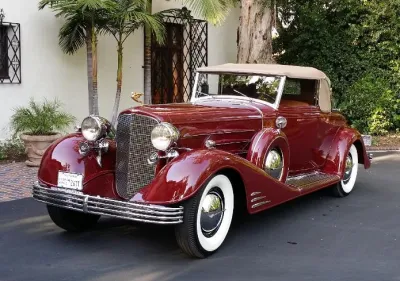
The Great Depression continued to effect the automobile industry. Cadillac announced that it would limit 1933 production of V-16’s to 400 motorcars. Only 126 were manufactured. 70 body styles were offered. 35 different body styles were actually built. Interior iterations constitute the slight differences between body styles. Half of the V-16’s delivered were 5 or 7 passenger sedans. The largest number of similar body styles delivered was 32 units.
The majority of Cadillac V-16’s bodies were built by Fleetwood. The example on display is the only Fisher Body convertible coupe constructed in 1933.
V-16's were built on a 149” wheel base, had the Vee-shaped grille/radiator shell, skirted fenders, and no-draft ventilation common to the full line. Detail distinction was achieved with a new, winged goddess mascot; large, spinner hub caps; absence of crankhole cover in the grill; and an awkward, four-bar bumper. Hood side panels carried two vertical doors plus three stylized horizontal louvers. Vertical louvers on front fender skirts, shown in promotional literature and used on mockups, were replaced in "production" by three horizontal louvers matching the hood louvers.
Mechanical changes were few. A higher compression ratio was available to utilize improved gasolines. Except on early production, wheel size was reduced from 18" to 17".
